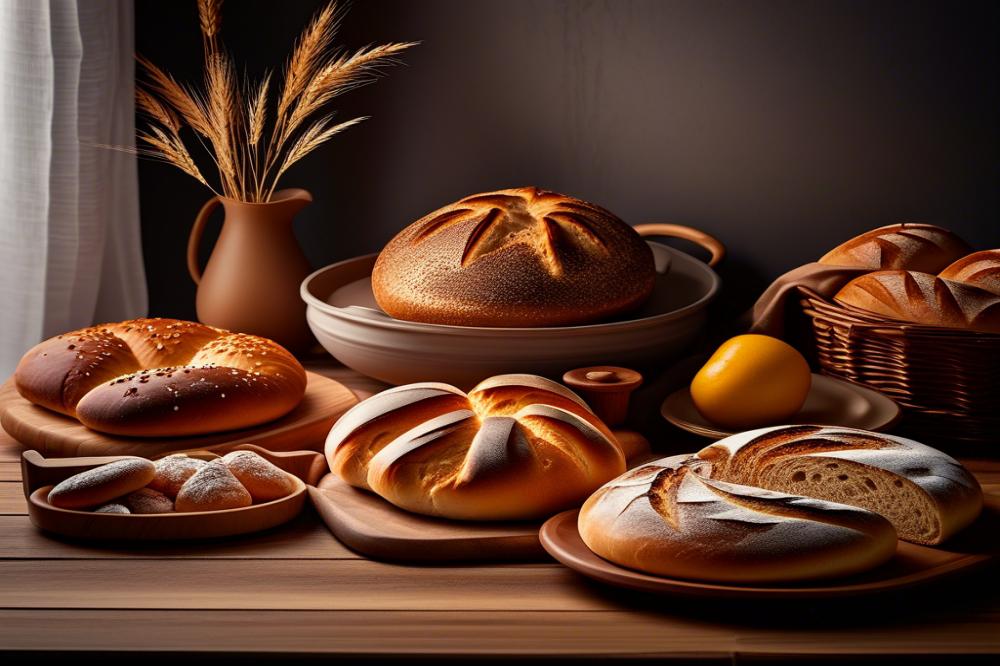A Culinary Tour of traditional bread baking in Greece
Exploring Greece provides a delightful journey into its rich culinary heritage. Among many delights, one can discover the significance of bread in everyday life. Greek bread is more than just a staple; it is a symbol of community, family, and tradition. Each region of the country boasts its own unique baking traditions, shaped by local ingredients and cultural backgrounds.
Artisan loaves, such as sourdough, are crafted with time-honored techniques passed down through generations. The process of baking homemade bread is an expression of love and care, often involving families gathering together to share in the activity. Pita is another classic variety, known for its versatility and use in countless dishes, from gyros to dips.
As we delve deeper into the world of Greek bread, it becomes clear that each type carries a story. Regional variations reflect the local environment, from the salty winds of the islands to the fertile lands of the mainland. Ingredients vary too, with many bakers using ancient grains or herbs from their gardens to create distinctive flavors.
Baking traditions reveal connections to identity and history. Each loaf represents not just nourishment, but also a link to one’s roots. Understanding the cultural significance of bread in Greece invites travelers to engage more deeply with the local way of life. With every bite, you savor a piece of Greece’s past and present.
traditional bread baking
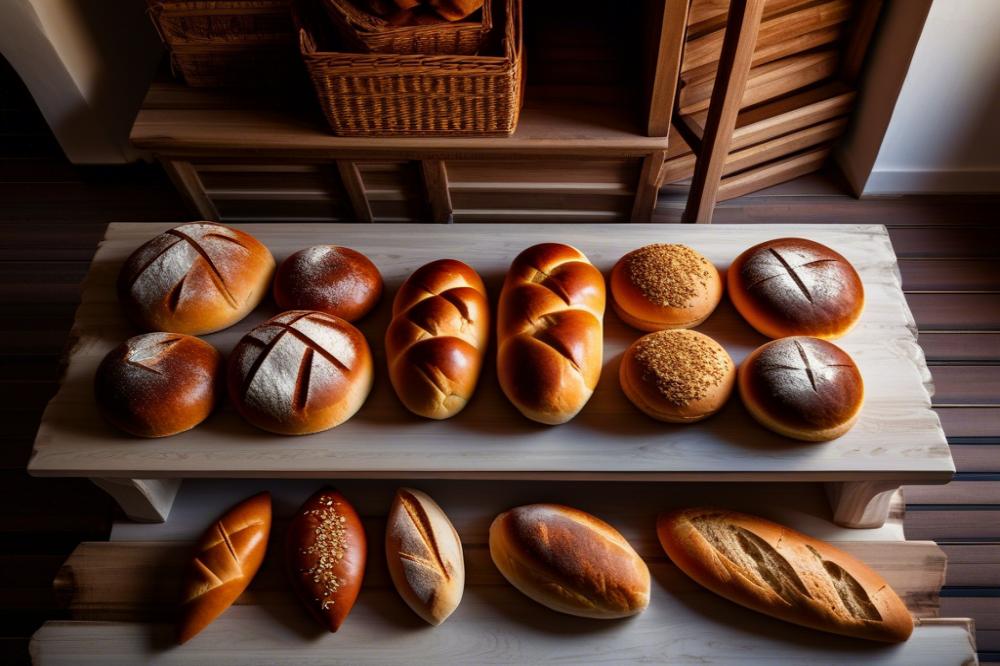
Bread has an important place in Greek culture, deeply tied to the country’s history. For centuries, families have gathered to enjoy the simple pleasure of homemade bread. In many households, this staple is more than just food; it is a symbol of warmth and hospitality. The practice of baking has been handed down through generations, showcasing the culinary heritage of Greece.
Throughout Greece, various types of bread are made. artisan loaves, baked with care, often use local ingredients like olive oil and flour from regional mills. This results in flavors that reflect the landscape. Sourdough also holds a special spot in many Greeks’ hearts. The tangy taste and chewy texture make it a favorite at the table.
Pita bread stands out with its unique pocket, perfect for dips or fillings. This versatile bread is essential in many meals, from quick snacks to elaborate feasts. Many families make it at home, enjoying the process of dough preparation and baking. Watching the bread puff up in the oven creates excitement and anticipation.
The cultural significance of bread extends beyond daily meals. It plays a role in various ceremonies and celebrations. For example, during religious festivals, special loaves may be baked and shared among families and friends. In moments of joy or sadness, bread symbolizes connection and unity.
Regional variations in bread reflect local customs and ingredients. The islands might feature different styles than those found in the mainland. Often, this diversity leads to delightful discoveries for anyone exploring Greek cuisine. Traditional baking traditions carry a sense of identity and pride among communities.
Every bite of Greek bread tells a story. It’s a connection to the land, the people, and their way of life. The art of bread baking remains alive, etched into the heart of Greek households everywhere.
Exploring Greek Bread Varieties
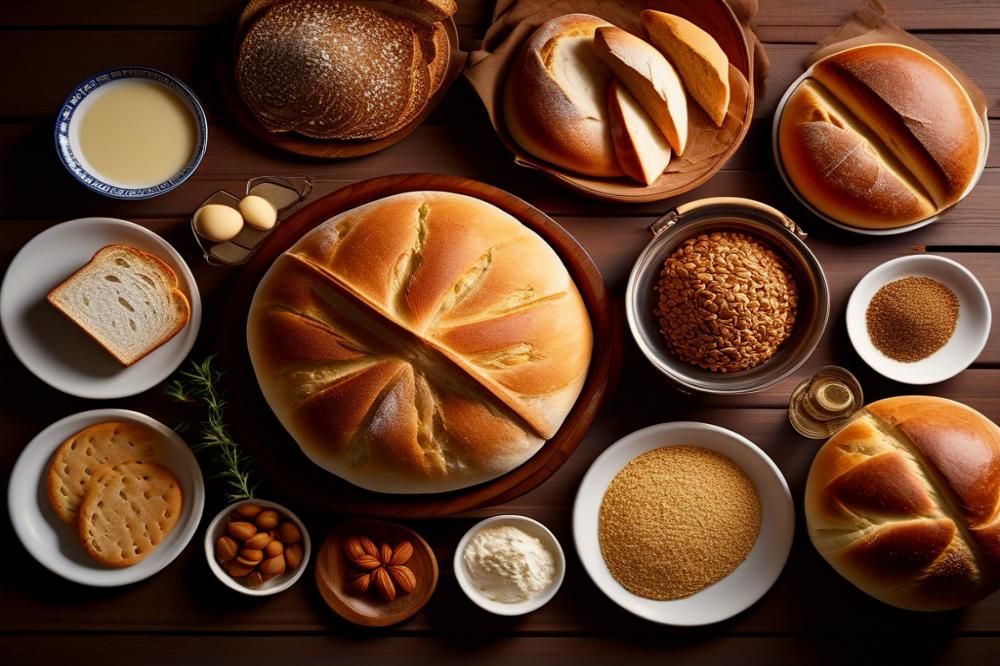
Greek bread boasts a vibrant array of regional variations that reflect the country’s diverse geographic and cultural landscape. Each region has its specialty, woven into the fabric of local life. From the bustling cities to the remote islands, the art of bread making remains a cherished part of daily routines.
In the mainland, one can find the classic artisan loaves of Thessaloniki. This northern city is known for its fluffy and hearty breads made from a mix of wheat and rye flour. Local bakers incorporate unique ingredients like olives and nuts, enriching flavors and textures. The climate there, with its colder winters, results in bread that is dense and filling—ideal for warming up during chilly months.
Moving south, to the Peloponnese, the round sourdough loaves known as “sikomaida” are popular. Bakers use overripe figs and dried fruits, showcasing the region’s agricultural bounty. The warmer climate allows for a different fermentation process, resulting in a slightly tangy flavor profile. This type of bread holds significant cultural significance, often served during local festivals.
On the islands, bread making takes on a different character. In Crete, one might encounter pita that is thicker and slightly chewy compared to its mainland counterparts. Their unique method involves local herbs, such as thyme and oregano, which impart an aromatic quality. Cretan pita often accompanies meals as a staple, proving how bread fits into everyday life.
Each island brings its own twist on ingredients. For instance, in the Cyclades, bakers utilize local ingredients like barley to create traditional barley bread. This hardy bread reflects the dry, rocky soil of the islands, where barley thrives. The baking traditions in these areas often highlight the environment’s influence on food practices and choices.
The Aegean Sea islands also feature a bread known as “kreatopita,” a meat pie that doubles as bread. Here, the ingredients are seasonal, and families often alter recipes passed down through generations. These variations are not mere recipes; they represent a rich culinary heritage that connects families to the land and each other.
In summary, Greece’s regional bread varieties reveal the treasures of its geography and history. Homemade bread fosters community, sustains life, and tells stories through its flavors and textures. As you travel through the country, you’ll discover the profound connection between the land, its people, and their beloved baked creations.
Baking Traditions and Techniques
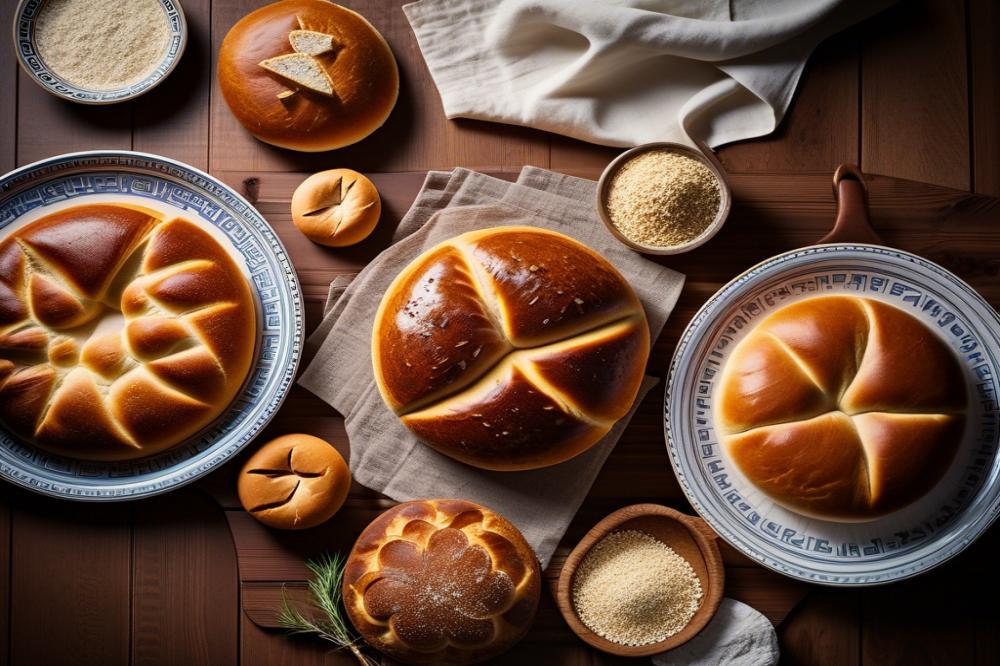
Greece is rich in baking traditions that have been passed down through generations. Homemade bread has a special place in every household. Communities come together to share the experience of creating bread, highlighting the importance of social bonds. Common practices involve gathering at communal ovens, where people take turns baking their artisan loaves. These ovens serve as a meeting point, fostering relationships among neighbors.
Many families guard cherished recipes that have been handed down through the years. Unique methods, like making sourdough, often require specific techniques that vary from region to region. Different areas of Greece boast their own regional variations, adding depth to the country’s culinary heritage. For example, some regions use local ingredients, which alters the flavor profiles of their bread.
Pita is one type of bread that showcases both versatility and simplicity. Traditionally, it is baked quickly and can be served with various dishes. Many homes prepare fresh pita daily, enjoying its warm, fluffy texture straight from the oven. This highlights the cultural significance of baking. Bread is more than sustenance; it is a symbol of love and care in Greek households.
Authenticity in both techniques and ingredients is crucial to Greek bread. Farmers often grow their own wheat, ensuring that the quality remains high. Bakers meticulously measure ingredients to maintain the right balance for fermentation. This attention to detail reflects the passion behind each loaf. It’s not just about baking; it’s about continuing a legacy through food.
Cultural events also play a role in sharing these baking traditions. Festivals celebrating bread bring communities together to taste various homemade bread. Local vendors showcase different types, from rustic loaves to tender pita. Each bread tells a story, echoing the heart of Greece’s diverse gastronomy.
In the end, bread is not just food. It is a way to connect with the past and present. As communities embrace their baking traditions, they preserve an essential part of their lifestyle. Whether enjoyed during a meal or offered to guests, Greek bread remains a timeless staple that continues to bring people together.
Cultural Significance of Bread
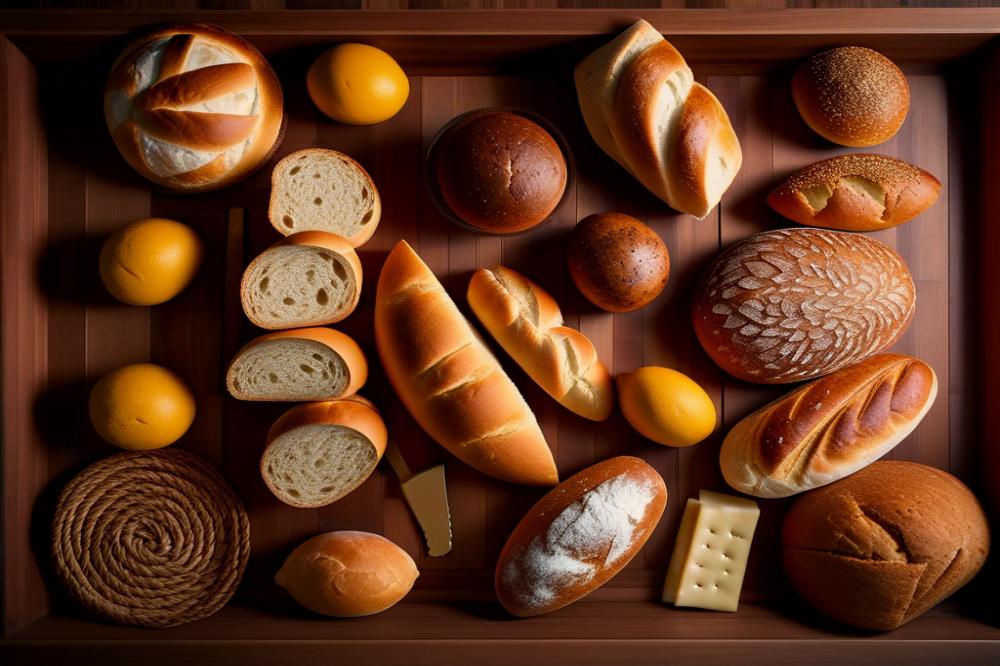
In Greece, bread holds a place of great importance in daily life and celebrations. Many families enjoy homemade bread during meals, making it an essential part of their diet. Greek bread comes in many forms, from artisan loaves to the soft, round pita. Each type reflects local ingredients and baking traditions that vary from region to region.
When examining bread’s role in special occasions, it is easy to see its deep-rooted significance. For example, during religious ceremonies, a special bread called “prosphora” is baked and offered in churches. This bread symbolizes the offerings made to the divine. Sharing bread often represents unity among families and friends during gatherings, as it brings people together around the table.
The symbolism of bread does not stop at celebrations. It appears in local customs, such as when a loaf is baked for a new home or a child’s birth. These traditions highlight the connection between food and pivotal life events. In many communities, baking bread is a cherished skill passed down through generations, reinforcing family ties and cultural identity.
Different regions also showcase various styles of sourdough and other bread types. Each area has its baking methods, allowing local flavors and practices to shine. The diversity in bread types mirrors Greece’s rich culinary heritage. This variety ensures that every loaf tells a story of its place of origin. One can find unique flavors and textures that reflect the soil, climate, and resources of each locale.
Even in modern times, these baking traditions remain relevant. People continue to appreciate homemade bread, celebrating its craftsmanship. Culinary heritage is alive when bakers use traditional techniques, mixing in local ingredients known only to their area. This passion for bread not only nourishes but also connects individuals to their history and community.
Consequently, bread in Greece goes beyond just a food item. It serves as a powerful symbol of culture, identity, and connection. The practice of baking bread unites people with their past while anchoring them in their present. In Greece, every crust, every crumb has a story worth telling.
Homemade Bread in Greek Households
Across Greece, a rising trend in homemade bread is blossoming. Families are embracing the art of baking in their own kitchens. This revival reflects a deeper appreciation for culinary heritage. Many people are turning to recipes that have been passed down through generations. Their focus lies on the taste, texture, and cultural significance of bread.
Local ingredients play a pivotal role in this process. Farmers’ markets showcase fresh grains and organic flour. Bakers often source herbs and spices from nearby gardens. These choices help create distinct flavors in artisan loaves. Regional variations emerge, as each area brings its own twist to recipes. For instance, sourdough made with wild yeast captures a specific essence that speaks to local land. Pita, a beloved flatbread, also varies in style and preparation among different regions.
Baking traditions hold a prominent place in the heart of Greek life. Many families gather to knead dough together. The process fosters a sense of community and sharing. It reminds everyone of simpler times. This connection to the past fuels the desire to make bread at home. Furthermore, creating bread from scratch allows for creativity and experimentation.
People enjoy the unique experience of monitoring the dough as it rises. Each loaf tells a story through its shape and crust. Homemade bread often provides more than just nutrition. It embodies love and warmth, filling homes with delightful aromas. For many Greeks, the act of baking serves as a reminder of family gatherings and festive occasions.
Ultimately, the trend of homemade bread illustrates a broader movement. People are rediscovering the joys of traditional cooking. It’s more than just a meal; it’s a connection to their roots. Choosing to bake bread at home reflects a commitment to quality ingredients and time-honored practices. This culinary journey honors the past while nurturing the present.
Final Thoughts
A culinary journey through Greece reveals much about the nation’s soul, with bread playing a central role. This favored food is more than just a staple; it acts as a cultural cornerstone that binds communities together. Each loaf tells a story, whether it be a crusty village bread or delicate pita. The art of baking these breads connects generations, passing down recipes and techniques that have stood the test of time.
Every region boasts its own variety of Greek bread, reflecting local ingredients and traditions. Through artisan loaves, bakers express their heritage and pride in their craft. Observing these bakers at work offers insight into their dedication and passion. Each knead and fold reveals their deep connection to the land and its bounty.
Traveling to Greece is an opportunity to appreciate this aspect of the cuisine fully. Stepping into a local bakery can be a delightful experience. The warm scent of freshly baked bread envelops you, welcoming you into a world of culinary tradition. Engaging with the bakers can add another layer to this wonderful experience. Their stories will deepen your understanding of the cultural significance behind each loaf.
Personal exploration is equally rewarding. Baking your own bread inspired by Greek recipes can connect you to that rich tradition. It allows you to appreciate the time and effort involved in creating these beloved foods. Discovering the nuances of various techniques can lead to new culinary adventures.
In summary, the tradition of baking bread in Greece is a rich tapestry of history and culture. Embrace the experience, whether through travel, cooking, or both. Honor the craftsmanship that makes each bite a taste of heritage.

